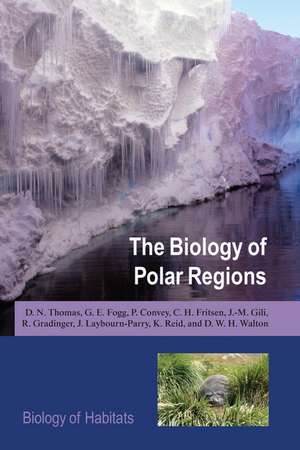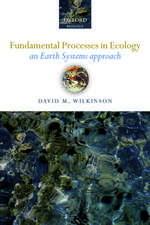The Biology of Polar Regions: Biology of Habitats Series
Autor D.N. Thomas, G.E. Fogg, P. Convey, C.H. Fritsen, J.-M. Gili, R. Gradinger, J. Laybourn-Parry, K. Reid, D.W.H. Waltonen Limba Engleză Paperback – 20 mar 2008
| Toate formatele și edițiile | Preț | Express |
|---|---|---|
| Paperback (1) | 397.77 lei 31-37 zile | |
| OUP OXFORD – 20 mar 2008 | 397.77 lei 31-37 zile | |
| Hardback (1) | 974.69 lei 6-8 săpt. | |
| OUP OXFORD – 19 mar 2008 | 974.69 lei 6-8 săpt. |
Preț: 397.77 lei
Preț vechi: 486.83 lei
-18% Nou
Puncte Express: 597
Preț estimativ în valută:
76.12€ • 80.04$ • 62.89£
76.12€ • 80.04$ • 62.89£
Carte tipărită la comandă
Livrare economică 05-11 aprilie
Preluare comenzi: 021 569.72.76
Specificații
ISBN-13: 9780199298136
ISBN-10: 0199298130
Pagini: 410
Ilustrații: 8 pp colour plates, 51 line and 78 halftone illustrations
Dimensiuni: 156 x 234 x 20 mm
Greutate: 0.64 kg
Ediția:2
Editura: OUP OXFORD
Colecția OUP Oxford
Seria Biology of Habitats Series
Locul publicării:Oxford, United Kingdom
ISBN-10: 0199298130
Pagini: 410
Ilustrații: 8 pp colour plates, 51 line and 78 halftone illustrations
Dimensiuni: 156 x 234 x 20 mm
Greutate: 0.64 kg
Ediția:2
Editura: OUP OXFORD
Colecția OUP Oxford
Seria Biology of Habitats Series
Locul publicării:Oxford, United Kingdom
Recenzii
Review from previous edition This is a masterful synthesis of information across many disciplines about the two polar regions giving, as intended, a readily accessible overview that deserves a long future role as the foundation to the teaching and understanding of polar biology.
...This up-to-date text provides an excellent introduction to polar ecology...The author has considerable experience in this field and both researchers and students of ecology and conservation will find the book of value.
...This up-to-date text provides an excellent introduction to polar ecology...The author has considerable experience in this field and both researchers and students of ecology and conservation will find the book of value.
Notă biografică
Dr. David N. Thomas is Professor in Marine Biology at the School of Ocean Sciences, University of Wales Bangor. Between 1989 and 1996 he held four research scientist posts in Germany at the University of Bremen, Alfred Wegener Institute, Bremerhaven, University of Oldenburg and Centre for Marine Tropical Ecology, Bremen. He was appointed to his position at the University of Wales-Bangor in July 1996. In 2001 to 2003 he held an Ocean and Climate Research Fellowship at the Hanse Institute for Advanced Study, Germany.G. E. Fogg was Professor Emeritus of Marine Biology, School of Ocean Sciences University of Wales, Bangor.Dr. Peter Convey is Research Scientist at the Biological Sciences Division of the British Antarctic Survey.Dr. Christian Fritsen is Assistant Research Professor in the Division of Earth and Ecosystem Sciences at the Desert Research Institute, Nevada, USA.Dr Josep-Maria Gili is of the Institut de Ciències del Mar, Spanish National Research CouncilDr Rolf Gradinger is Assistant Professor of Biological Oceanography at the School of Fisheries and Ocean Sciences, University of Alaska, FairbanksProf. Johanna Laybourn-Parry is Dean of Natural Sciences at Keele University. Her research interests centre around polar limnology, in particular carbon cycling, environmental microbiology, protozoan ecophysiology and biological processes on glaciers. Her Antarctic work is conducted with the Australian and US Antarctic programmes while her work in the Arctic is conducted in Svalbard. She has been funded by NERC, The Leverhulme Trust, EPSRC, Industry, the US National Science Foundation and the Australian Antarctic Science Advisory Committee (ASAC). She currently holds a grant from the Leverhulme Trust for work on protozoan feeding selectivity physiology and from ASAC for investigating bacterial biodiversity in Antarctic saline lakes. Dr. Keith Reid is an ecologist at the British Antarctic Survey.Professor David Walton is a chief scientist at the British Antarctic Survey.























